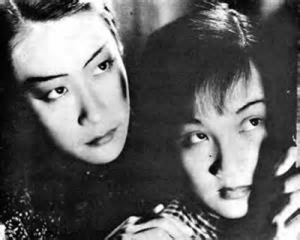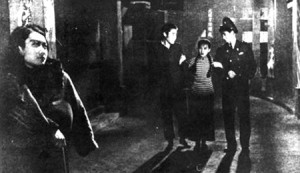RAS Shanghai Film Club – “Street Angel,” 1937
Posted: November 29th, 2014 | No Comments »RAS FILM CLUB
Sunday 30 November
Time: 6.30pm for 7.00pm
 Chai Lounge at Chai Living Gallery, 370 Suzhou Bei Lu. It’s in the Embankment Building close to Henan Lu.
 河滨大楼,è‹å·žåŒ—è·¯370底楼 (在四å·è·¯æ²³å—路之间)
“Street Angel,” “Malu tianshi,” 1937
Directed by Yuan Muzhi
Written by Yuan Muzhi
Produced by Mingxing Film Company
Mandarin with English subtitles
Cinematography: Wu Yinxian
Original music: He Luting, lyrics by Tian Han
Cast: Zhou Xuan (Xiao Hong), Zhao Dan (Xiao Chen), Zhao Huishen (Xiao Yun), Wei Heling (Wang)
One of China’s early sound films, loosely based on Frank Borage’s 1927 silent film “Seventh Heaven,” “Street Angel” is considered a great classic ‘leftist’ melodrama made during Shanghai’s Golden Age of cinema. The story revolves around two sisters (Xiao Yun and Xiao Hong) who have fled the war with Japan in the North to land in Shanghai’s underworld. They live together in a teahouse amongst the slums and barely earn their keep by singing and, for Xiao Yun, prostitution. Xiao Hong is befriended by a street musician, Xiao Chen, who determines to rescue her from her fate of being sold into marriage (and probably prostitution) with the wealthy Mr Gu. An astounding mixture of satire, social realism, slapstick comedy and music, “Street Angel” provides a portrait of street life in 1930’s Shanghai and a glimpse of the creative talent within Shanghai’s film industry.
 “Street Angel” launched the career of its leading lady Zhou Xuan whose voice became synonymous with Shanghai popular music of the day. In the film she sings two of her most famous hits, Song of the Four Seasons and The Wandering Songstress, both of which reference the political turbulence of the late 1930’s through Tian Han’s lyrics. The innovative use of music as a device to convey political messages to the audience and to add to the character of the actors set this film apart from its predecessors.
 Perhaps most often cited for its opening sequence in which Yuan Muzhi made use of the montage technique popularised in the Soviet Union to create a visual and musical portrait of the social conditions prevalent in Shanghai. A travelling night scene in the city, punctuated by a dizzying array of neon signs in English and Chinese accompanied by frenzied music conveys the electrifying energy of Shanghai nightlife. Dissolving into daytime, the camera tilts upwards as it pans an art deco building to rest on a western clock, the icon of modernism. Scenes of automobiles, buses, ships and colonial monuments culminate in a slow shot of the Hong Kong Bank and the Customs House on the Bund. Different types of religious buildings shift the focus from commercial life to spiritual life whilst retaining the influences from all over the world on  Shanghai life.
Shanghai life.
 As clocks continue to chime and dusk falls fireworks cascade over pleasure seekers filling the dance halls and the increasingly frantic musical accompaniment collapses into silence over the title of the film. The result is a feeling that Shanghai, full of competing influences and rushing forwards is fighting against time to shake off its colonialism and to modernise. The perspective and the pace then shifts to street level as the camera follows a traditional Chinese wedding procession into the lanes of Shanghai and away from decadence. Here the houses are densely populated and low-rise. People are lining the street and hanging over balconies to watch the procession with the bride in a palanquin. Amongst the crowd, playing a trumpet appears our first glimpse of Xiao Chen and above him on the balcony emerges Xiao Hong and the dialogue begins. As in the theatre that preceded cinema, the female looks down onto the male actor and catches his attention, drawing the audience into the story. This is the first of several references to theatre that Yuan Mizhu uses within the film to dramatic effect.
 Within these opening moments the director succeeds in displaying Shanghai’s history, it’s social complexity and it’s physical distinctions between colonial and neighbourhood spaces before focusing upon a story that revolves around two related social issues of the time, migration and prostitution.
Running time; 91 minutes
Our evening will be hosted at CHAI Living Gallery.  They kindly provide the venue, equipment, a discount on the menu AND specially prepared popcorn for RAS members to enjoy while watching the movie.

Donation suggested: RMB 20.00 (RAS members) and RMB 50.00 (non-members). Those unable to make the donation but wishing to attend may contact us for exemption, prior to the RAS Film Club viewing. Membership applications and membership renewals will be available at this event.
RSVP: “Reply” to this email or write to filmclub@
RSVP ESSENTIAL AS SPACE IS LIMITED!
RAS MEMBERS WILL RECEIVE PRIORITY BOOKING UNTIL FRIDAYÂ November 28


Leave a Reply